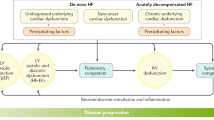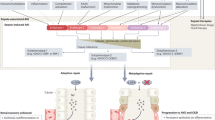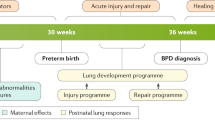Abstract
Intestinal failure in neonatal and pediatric populations can be debilitating for patients and difficult to manage for clinicians. Management strategies include referral to an intestinal rehabilitation center, small volume trophic feeds to stimulate the intestine with cautious advancement of enteral nutrition using a standardized and evidence-based feeding protocol, and supplemental parenteral nutrition to optimize an infant’s growth and nutrition. In this review, we discuss the causes of intestinal failure, parenteral nutrition strategies, enteral feeding initiation and advancement protocols, as well as the challenges in feeding an infant with intestinal failure.
This is a preview of subscription content, access via your institution
Access options
Subscribe to this journal
Receive 12 print issues and online access
$259.00 per year
only $21.58 per issue
Buy this article
- Purchase on Springer Link
- Instant access to full article PDF
Prices may be subject to local taxes which are calculated during checkout

Similar content being viewed by others
Data availability
Data sharing is not applicable to this manuscript as no new data were generated or analyzed in this study.
References
Merritt RJ, Cohran V, Raphael BP, Sentongo T, Volpert D, Warner BW, et al. Intestinal Rehabilitation Programs in the Management of Pediatric Intestinal Failure and Short Bowel Syndrome. J. Pediatr. Gastroenterol. Nutr. 2017;65:588–96.
Wessel JJ, Kocoshis SA. Nutritional management of infants with short bowel syndrome. Semin. Perinatol. 2007;31:104–11.
Squires RH, Duggan C, Teitelbaum DH, Wales PW, Balint J, Venick R, et al. Natural history of pediatric intestinal failure: initial report from the Pediatric Intestinal Failure Consortium. J. Pediatr. 2012;161:723–8.e2.
Modi BP, Galloway DP, Gura K, Nucci A, Plogsted S, Tucker A, et al. ASPEN definitions in pediatric intestinal failure. JPEN J. Parenter. Enter. Nutr. 2022;46:42–59.
Hess RA, Welch KB, Brown PI, Teitelbaum DH. Survival outcomes of pediatric intestinal failure patients: analysis of factors contributing to improved survival over the past two decades. J. Surg. Res. 2011;170:27–31.
Wales PW, de Silva N, Kim J, Lecce L, To T, Moore A. Neonatal short bowel syndrome: population-based estimates of incidence and mortality rates. J. Pediatr. Surg. 2004;39:690–5.
Khan FA, Squires RH, Litman HJ, Balint J, Carter BA, Fisher JG, et al. Predictors of Enteral Autonomy in Children with Intestinal Failure: A Multicenter Cohort Study. J. Pediatr. 2015;167:29–34.e1.
Gattini D, Roberts AJ, Wales PW, Beath SV, Evans HM, Hind J, et al. Trends in Pediatric Intestinal Failure: A Multicenter, Multinational Study. J. Pediatr. 2021;237:16–23.e4.
Peters FB, Bone JN, Van Oerle R, Albersheim S, Casey L, Piper H. The Importance of the ileocecal valve and colon in achieving intestinal independence in infants with short bowel syndrome. J. Pediatr. Surg. 2022;57:117–21.
Cole CR, Hansen NI, Higgins RD, Ziegler TR, Stoll BJ. Network EKSNNR. Very low birth weight preterm infants with surgical short bowel syndrome: incidence, morbidity and mortality, and growth outcomes at 18 to 22 months. Pediatrics. 2008;122:e573–82.
Khalaf RT, Sokol RJ. New Insights Into Intestinal Failure-Associated Liver Disease in Children. Hepatology. 2020;71:1486–98.
Pichler J, Horn V, Macdonald S, Hill S. Intestinal failure-associated liver disease in hospitalised children. Arch. Dis. Child. 2012;97:211–4.
Abi Nader E, Lambe C, Talbotec C, Pigneur B, Lacaille F, Garnier-Lengliné H, et al. Outcome of home parenteral nutrition in 251 children over a 14-y period: report of a single center. Am. J. Clin. nutrition. 2016;103:1327–36.
Hair A, Premkumar M. Intestinal Failure and Intestinal Rehabilitation. In: Gastroenterology: Guidelines for Acute Care of the Neonate 30th edition (2022- 2023) FC, Pammi M, Katakam L (Eds), Baylor College of Medicine. Copyright ©2022.
Fatemizadeh R, Gollins L, Hagan J, Debuyserie A, King K, Vogel AM, et al. In neonatal-onset surgical short bowel syndrome survival is high, and enteral autonomy is related to residual bowel length. JPEN J. Parenter. Enter. nutrition. 2022;46:339–47.
Smazal AL, Massieu LA, Gollins L, Hagan JL, Hair AB, Premkumar MH. Small Proportion of Low-Birth- Weight Infants With Ostomy and Intestinal Failure Due to Short-Bowel Syndrome Achieve Enteral Autonomy Prior to Reanastomosis. JPEN J. Parenter. Enter. nutrition. 2021;45:331–8.
Rochling FA. Intravenous Lipid Emulsions in the Prevention and Treatment of Liver Disease in Intestinal Failure. Nutrients. 2021;13:895.
Omegaven Prescribing Information from the Food and Drug Administration.
Gura KM, Lee S, Valim C, Zhou J, Kim S, Modi BP, et al. Safety and efficacy of a fish-oil-based fat emulsion in the treatment of parenteral nutrition-associated liver disease. Pediatrics. 2008;121:e678–86.
Gura KM, Calkins KL, Premkumar MH, Puder M. Use of Intravenous Soybean and Fish Oil Emulsions in Pediatric Intestinal Failure-Associated Liver Disease: A Multicenter Integrated Analysis Report on Extrahepatic Adverse Events. The J. pediatrics. 2022;241:173–80.e1.
Wang C, Venick RS, Shew SB, Dunn JCY, Reyen L, Gou R, et al. Long-Term Outcomes in Children With Intestinal Failure-Associated Liver Disease Treated With 6 Months of Intravenous Fish Oil Followed by Resumption of Intravenous Soybean Oil. JPEN J. Parenter. Enter. nutrition. 2019;43:708–16.
Nandivada P, Fell GL, Mitchell PD, Potemkin AK, O'Loughlin AA, Gura KM, et al. Long-Term Fish Oil Lipid Emulsion Use in Children With Intestinal Failure-Associated Liver Disease [Formula: see text]. JPEN J. Parenter. Enter. nutrition. 2017;41:930–7.
SMOFlipid prescribing information Food and Drug Administration.
Wendel D, Mezoff EA, Raghu VK, Kinberg S, Soden J, Avitzur Y, et al. Management of Central Venous Access in Children With Intestinal Failure: A Position Paper From the NASPGHAN Intestinal Rehabilitation Special Interest Group. J. Pediatr. Gastroenterol. Nutr. 2021;72:474–86.
Mehta NM, Skillman HE, Irving SY, Coss-Bu JA, Vermilyea S, Farrington EA, et al. Guidelines for the Provision and Assessment of Nutrition Support Therapy in the Pediatric Critically Ill Patient: Society of Critical Care Medicine and American Society for Parenteral and Enteral Nutrition. JPEN J. Parenter. Enter. nutrition. 2017;41:706–42.
van Goudoever JB, Carnielli V, Darmaun D, Sainz de Pipaon M. ESPGHAN/ESPEN/ ESPR/CSPEN guidelines on pediatric parenteral nutrition: Amino acids. Clin. Nutr. 2018;37:2315–23.
American Academy of Pediatrics Committee on Nutrition. Nutritional Needs of Preterm Infants. In: Kleinman RE GF, eds. Pediatric Nutrition. 8th ed. Itasca, IL: American Academy of Pediatrics. 2019: p.17-43.
Koletzko B, Poindexter B, Uauy R. Recommended nutrient intake levels for stable, fully enterally fed very low birth weight infants. World Rev. Nutr. dietetics. 2014;110:297–9.
Javid PJ, Oron AP, Duggan CP, Squires RH, Horslen SP. Consortium PIF The extent of intestinal failureassociated liver disease in patients referred for intestinal rehabilitation is associated with increased mortality: an analysis of the Pediatric Intestinal Failure Consortium database. J. pediatric surgery. 2018;53:1399–402.
Muhammed R, Bremner R, Protheroe S, Johnson T, Holden C, Murphy MS. Resolution of parenteral nutrition-associated jaundice on changing from a soybean oil emulsion to a complex mixed-lipid emulsion. J. Pediatr. Gastroenterol. Nutr. 2012;54:797–802.
Hojsak I, Colomb V, Braegger C, Bronsky J, Campoy C, Domellöf M, et al. ESPGHAN Committee on Nutrition Position Paper. Intravenous Lipid Emulsions and Risk of Hepatotoxicity in Infants and Children: a Systematic Review and Meta-analysis. J. Pediatr. Gastroenterol. Nutr. 2016;62:776–92.
Lacaille F, Gupte G, Colomb V, D'Antiga L, Hartman C, Hojsak I, et al. Intestinal failure-associated liver disease: a position paper of the ESPGHAN Working Group of Intestinal Failure and Intestinal Transplantation. J. Pediatr. Gastroenterol. Nutr. 2015;60:272–83.
McCallie KR, Lee HC, Mayer O, Cohen RS, Hintz SR, Rhine WD. Improved outcomes with a standardized feeding protocol for very low birth weight infants. J. Perinatology. 2011;31:S61–S7.
Morton DL, Hawthorne KM, Moore CE. Growth of Infants with Intestinal Failure or Feeding Intolerance Does Not Follow Standard Growth Curves. J. Nutr. metabolism. 2017;2017:8052606.
Gosselin KB, Duggan C. Enteral nutrition in the management of pediatric intestinal failure. J. pediatrics. 2014;165:1085–90.
Tappenden KA. Intestinal adaptation following resection. JPEN J. Parenter. Enter. nutrition. 2014;38:23s–31s.
Meier P, Patel A, Esquerra-Zwiers A. Donor Human Milk Update: Evidence, Mechanisms, and Priorities for Research and Practice. J. pediatrics. 2017;180:15–21.
Ou J, Courtney CM, Steinberger AE, Tecos ME, Warner BW. Nutrition in Necrotizing Enterocolitis and Following Intestinal Resection. Nutrients. 2020;12:520.
Sohn K, Kalanetra KM, Mills DA, Underwood MA. Buccal administration of human colostrum: impact on the oral microbiota of premature infants. J. perinatology : Off. J. Calif. Perinat. Association. 2016;36:106–11.
Lee J, Kim HS, Jung YH, Choi KY, Shin SH, Kim EK, et al. Oropharyngeal colostrum administration in extremely premature infants: an RCT. Pediatrics. 2015;135:e357–66.
Rodriguez NA, Meier PP, Groer MW, Zeller JM. Oropharyngeal administration of colostrum to extremely low birth weight infants: theoretical perspectives. J. perinatology : Off. J. Calif. Perinat. Association. 2009;29:1–7.
Snyder R, Herdt A, Mejias-Cepeda N, Ladino J, Crowley K, Levy P. Early provision of oropharyngeal colostrum leads to sustained breast milk feedings in preterm infants. Pediatrics neonatology. 2017;58:534–40.
Agostoni C, Buonocore G, Carnielli VP, De Curtis M, Darmaun D, Decsi T, et al. Enteral nutrient supply for preterm infants: commentary from the European Society of Paediatric Gastroenterology, Hepatology and Nutrition Committee on Nutrition. J. Pediatr. Gastroenterol. Nutr. 2010;50:85–91.
Pearson F, Johnson MJ, Leaf AA. Milk osmolality: does it matter? Arch. Dis. Child. Fetal neonatal edition. 2013;98:F166–9.
Bines J, Francis D, Hill D. Reducing parenteral requirement in children with short bowel syndrome: impact of an amino acid-based complete infant formula. J. Pediatr. Gastroenterol. Nutr. 1998;26:123–8.
Olieman J, Kastelijn W. Nutritional Feeding Strategies in Pediatric Intestinal Failure. Nutrients. 2020;12:177.
Parker P, Stroop S, Greene H. A controlled comparison of continuous versus intermittent feeding in the treatment of infants with intestinal disease. J. pediatrics. 1981;99:360–4.
Joly F, Dray X, Corcos O, Barbot L, Kapel N, Messing B. Tube feeding improves intestinal absorption in short bowel syndrome patients. Gastroenterology. 2009;136:824–31.
Olieman JF, Penning C, Ijsselstijn H, Escher JC, Joosten KF, Hulst JM, et al. Enteral nutrition in children with short-bowel syndrome: current evidence and recommendations for the clinician. J. Am. Dietetic Association. 2010;110:420–6.
Goulet O, Olieman J, Ksiazyk J, Spolidoro J, Tibboe D, Köhler H, et al. Neonatal short bowel syndrome as a model of intestinal failure: physiological background for enteral feeding. Clin. Nutr. 2013;32:162–71.
Cernat E, Corlett C, Iglesias N, Onyeador N, Steele J, Batra A. Short bowel syndrome in infancy: recent advances and practical management. Frontline gastroenterology. 2021;12:614–21.
Patole S, Rao S, Doherty D. Erythromycin as a prokinetic agent in preterm neonates: a systematic review. Arch. Dis. Child. Fetal neonatal edition. 2005;90:F301–6.
Ching YA, Gura K, Modi B, Jaksic T. Pediatric intestinal failure: nutrition, pharmacologic, and surgical approaches. Nutr. Clin. Pract. : Off. Publ. Am. Soc. Parenter. Enter. Nutrition. 2007;22:653–63.
Curry JI, Lander TD, Stringer MD. Review article: erythromycin as a prokinetic agent in infants and children. Aliment Pharmacol Ther. 2001;15:595–603.
Rybak A, Sethuraman A, Nikaki K, Koeglmeier J, Lindley K, Borrelli O. Gastroesophageal Reflux Disease and Foregut Dysmotility in Children with Intestinal Failure. Nutrients. 2020;12:3536.
Elliott T, Walton JM. Safety of mucous fistula refeeding in neonates with functional short bowel syndrome: A retrospective review. J. pediatric surgery. 2019;54:989–92.
Acknowledgements
We would like to thank Dr. Murali Premkumar and Laura Gollins for their contributions to the NICU Intestinal Rehabilitation Guidelines at Texas Children’s Hospital, Baylor College of Medicine.
Funding
ABH and MG are supported by the National Institutes of Health (NIH) grant R01DK124614, and MG is also supported by NIH grants R01DK118568 and R01HD105301. None of the funding sources had any role in this manuscript.
Author information
Authors and Affiliations
Contributions
ABH and MG wrote the initial and final drafts of the manuscript, approved the final published version and are accountable for all aspects of the manuscript.
Corresponding author
Ethics declarations
Competing interests
The authors declare no competing interests.
Additional information
Publisher’s note Springer Nature remains neutral with regard to jurisdictional claims in published maps and institutional affiliations.
Rights and permissions
Springer Nature or its licensor holds exclusive rights to this article under a publishing agreement with the author(s) or other rightsholder(s); author self-archiving of the accepted manuscript version of this article is solely governed by the terms of such publishing agreement and applicable law.
About this article
Cite this article
Hair, A.B., Good, M. Dilemmas in feeding infants with intestinal failure: a neonatologist’s perspective. J Perinatol 43, 114–119 (2023). https://doi.org/10.1038/s41372-022-01504-4
Received:
Revised:
Accepted:
Published:
Issue Date:
DOI: https://doi.org/10.1038/s41372-022-01504-4



